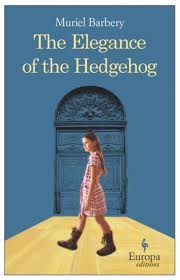The Elegance of the Hedgehog
Muriel Barbery. New York: Europa Editions, 2006
Two female narrators describe their lives in intermixed chapters. One is a fifty-four year old concierge at a condo for wealthy people, in contemporary Paris. The other is a twelve year-old rich girl, daughter of one of the tenants in that building. Both write in a first-person that is so intimate, it often verges on second person, addressing the reader directly. The girl’s thoughts are presented as entries into her diary, while the concierge more traditionally addresses the reader, but her entries also have a journalistic quality.
The chapters are about three pages each, some only one page, so the overall effect is like reading two online blogs, not diaries or journals. The chapters are formatted as traditional book chapters, but the reader has the sense of intimacy and fascination that one often feels reading somebody’s personal blog. “Today I gave the cat a new cat food.” “My sister is impossible!” And so on.
The concierge’s “blog” reveals her “secret life.” Yes, she is a humble caretaker who endures rudeness from the rich building tenants, but she is also secretly an erudite, self-taught intellectual. She finds beauty in Russian literature, European philosophy, Japanese film, Flemish painting, and English opera. She hides her learning and love of beauty from the world, and presents an outward persona of stooped, taciturn, gray-sweatered widow, an invisible nobody. This is the “hedgehog” presentation that hides her underlying “elegance.” Why does she live this way? That mystery is revealed very slowly, and not fully until the end of the book.
The young girl is an emotionally troubled adolescent who has vowed to kill herself within a year then set fire to the building, for the usual age-appropriate reasons: because nobody understands her, her family treats her dismissively, she hates her arrogant older sister, people are so hypocritical and superficial, and life is meaningless anyway. In her blog entries, she records her attempts to find a redeeming reason to live, before the twelve months expires. At nearly the end of the book, she makes friends with the concierge and begins to understand that there is more to life than what surface appearances reveal.
The writing is erudite but accessible, so it flatters the educated reader with its references to Edmund Husserl and Henry Purcell, without crossing the line into obscurantism. The concierge’s character of an autodidact is perfect for that technique. The language is elevated, in both blogs, with fine vocabulary and well-observed insights into French culture, the arts, and human nature. There is a bit of pretentiousness, but it is inoffensive because it comes from a self-taught concierge and an adolescent girl, so the well-educated reader can feel smug.
There is a tiny bit of drama toward the end of the book, when a new tenant moves into the building and immediately sees through the persona of the hedgehog concierge and treats her as a person. Realizing her cover is blown, she begins to reveal herself. But the dramatic moves at the end of the book seem contrived. They serve the literary function of causing the dénouement, but they also seem arbitrary and not convincing for these characters. But all the characters are thin, always in the background anyway, just as a blogger is hidden behind the blog and wants you to see only what has been chosen for revelation. It raises some interesting questions about the motivations people might have for producing personal blogs. Who do they think they are addressing? What are they not revealing?
In the end, it is a “message” novel, with a plausible, if plastic moral about the meaning of life. The ending collapses into maudlin sentimentality however, and that is disappointing because it was not necessary. The message was implicit in every page prior. How doe blogs end? They don’t. They are just abandoned, and that wouldn’t have worked for this literary form, so I guess some kind of an ending was needed. I have read that in France, it is common for writers of fiction to display their wares in blogs, and publishers troll these for talent, so the structure of this book also has a self-referential aspect.
Overall, it is a very pleasant, entertaining, thought-provoking, well-written book that keeps you turning the pages out of sheer voyeurism even if you are not deeply engaged.

